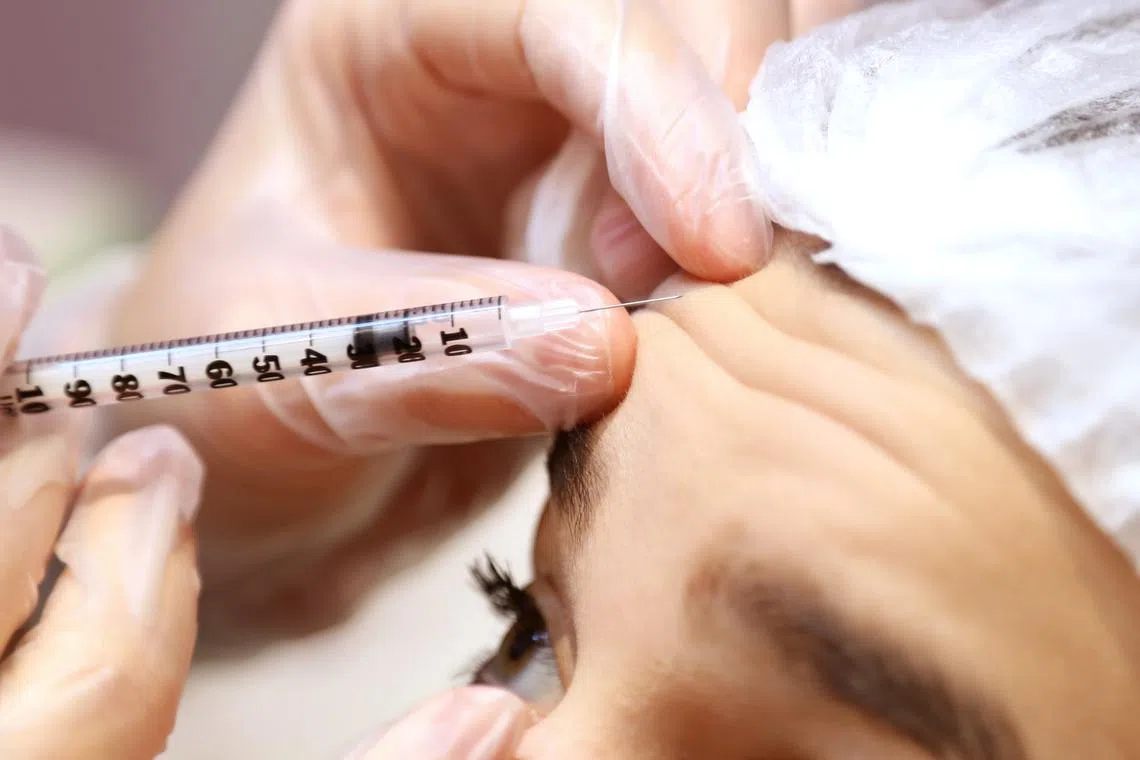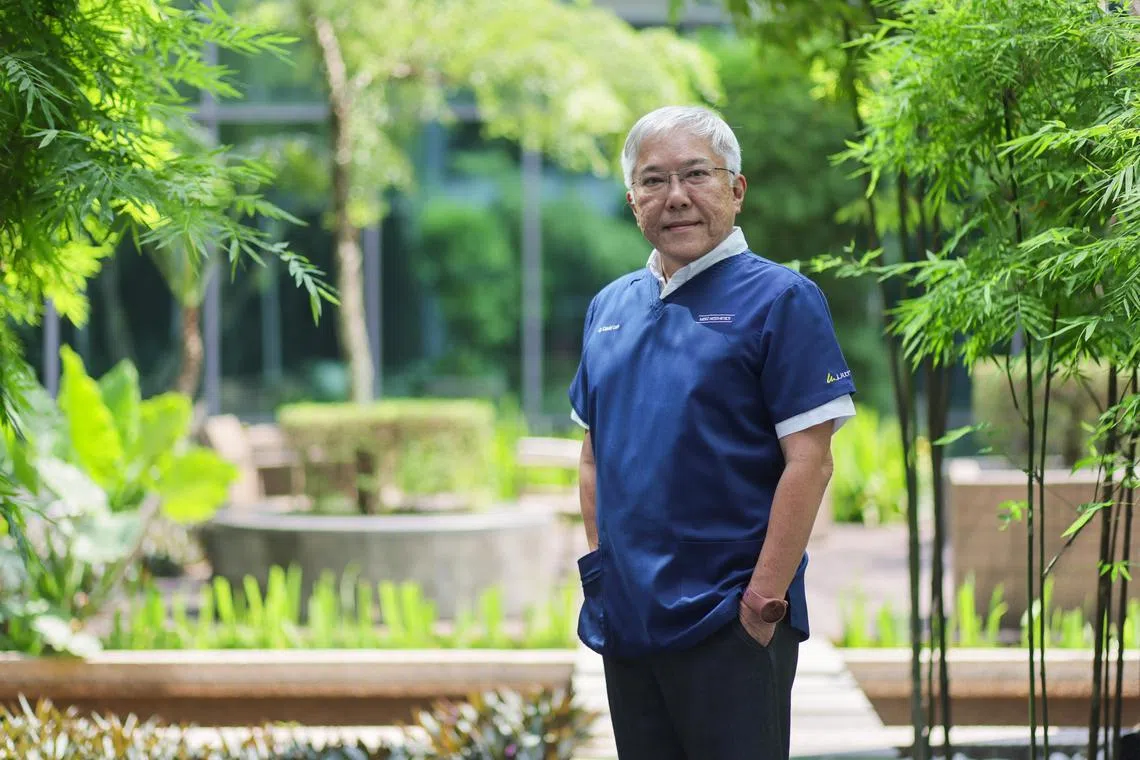More unregistered aesthetics treatment providers probed amid thriving industry
Sign up now: Get ST's newsletters delivered to your inbox

From 2020 to 2022, MOH investigated about 60 cases involving the provision of medical aesthetics procedures by non-registered individuals.
PHOTO ILLUSTRATION: UNSPLASH
Follow topic:
SINGAPORE – For 54-year-old housewife Mrs Lee, the allure of a Botox treatment to get rid of wrinkles and fine lines on her face for a mere $250 proved irresistible.
Such injectables typically cost more than double that amount at popular aesthetics clinics in Orchard Road. When Mrs Lee found that these aesthetics treatments were available at affordable rates at a beauty salon in Bedok, where she lives, she decided to take the plunge earlier in 2023.
In August, she returned to the salon for another round of treatments, only to find that the beautician who had administered the procedure to her was no longer there.
“I was told that there was an inspection by the authorities at the premises. After that, I didn’t see the beautician any more,” Mrs Lee, who declined to give her full name, told The Sunday Times.
Incidents like this are far from isolated. From 2020 to 2022, the Ministry of Health (MOH) investigated about 60 cases involving the provision of medical aesthetics procedures by non-registered individuals. This is about twice the number of similar investigations conducted between 2017 and 2019.
These individuals were not registered with the Singapore Medical Council as medical practitioners, nor did they hold any certificate of competency, said a spokeswoman for the ministry.
Of the cases between 2020 and 2022, about two-thirds have been resolved, while prosecutions or investigations are still under way for the rest of the cases.
Of the concluded cases, 10 were prosecuted and convicted in court, while the rest were issued with letters of warning or advice, said the MOH spokeswoman.
Mr Melvin Yong, president of the Consumers Association of Singapore (Case), said the organisation received 22 complaints relating to adverse effects from aesthetics treatments in the first six months of 2023.
For the whole of 2022, Case recorded 29 complaints, down from 35 in 2021. These complaints typically involved issues such as burns, skin damage, scarring, swelling and infections after treatments like facial and IPL (intense pulsed light) therapy, noted Mr Yong.
For Mrs Lee, the incident at the Bedok salon served to remind her to stay vigilant when considering aesthetics treatments.
“Luckily, I did not have any complications,” she said in Mandarin.
“I read in the news recently that a woman went blind after undergoing an aesthetics procedure, and I thought that could have happened to me, too.”
In September, ST broke the news that a woman in her 30s went blind in July
The Health Sciences Authority, which concluded its investigations on the product in October, said it found no evidence of product-related safety and quality issues.
In 2022, 34-year-old medical doctor Chan Bingyi was charged with negligence in the death of his 31-year-old patient Lau Li Ting,
More licensed clinics offering aesthetics treatment
Statistics from MOH showed that the number of licensed clinics offering aesthetics services in the last three years increased, at a rate of about 40 a year.
But the proportion of such clinics over the total number of licensed clinics, which includes private general practitioner and specialist practices, has remained consistent at about 14 per cent over the same period. At the end of December 2022, around 700 licensed clinics had indicated to the health ministry that they provided aesthetics services.
Dr David Loh, president of the Society of Aesthetic Medicine in Singapore, noted that an increase in investor interest in the aesthetics sector has led to many new aesthetics groups being formed in recent years. The society has about 200 members.
These new businessmen-led aesthetics groups expand rapidly, and hire many young doctors who are fresh out of school, said Dr Loh.
The current system of accreditation for new aesthetics doctors is based on theory exams and those who obtain what is known as a certificate of competency, he added.
New aesthetics doctors often lack the hands-on training to perform procedures confidently, in particular for injectables, said Dr Loh, who runs an aesthetics medicine practice at Novena Medical Centre.

Dr David Loh, president of the Society of Aesthetic Medicine in Singapore, says aesthetics doctors often lack the necessary hands-on-training.
ST PHOTO: GIN TAY
In a survey done by the Society of Aesthetic Medicine in August, almost all (96.3 per cent) of the 135 members who took part in the survey felt that mentorship is relevant for new aesthetics doctors, given the rapid growth of new aesthetics clinics, said Dr Loh.
About 88.8 per cent of the respondents agreed that new aesthetics doctors should perform a minimum number of cases – in particular for injectables – under the supervision of a senior aesthetics doctor.
The increasing number of clinics vying for the attention of beauty-conscious consumers has stirred fierce competition, often resulting in price cuts to attract clients, noted market observers.
Anti-ageing procedures are and have always been the main driver of growth in the industry, said Dr Tan Ying Zhou, founder and medical director of Mizu Aesthetic Clinic.
“The advancement of technology in aesthetics medicine has allowed us to perform safer but more effective procedures. The improvement in results, safety profile and social media advertising has led to growth in recent years,” he added.
Acknowledging concerns over price wars, Dr Loh emphasised that while price is a factor, it should not be the sole criterion for consumers when choosing medical services, with results and safety being of paramount importance.
Some people have also resorted to using do-it-yourself aesthetics injectables, such as Botox-like substances and skin boosters, which are available on e-commerce platforms.
The HSA has warned against using such DIY kits at home


